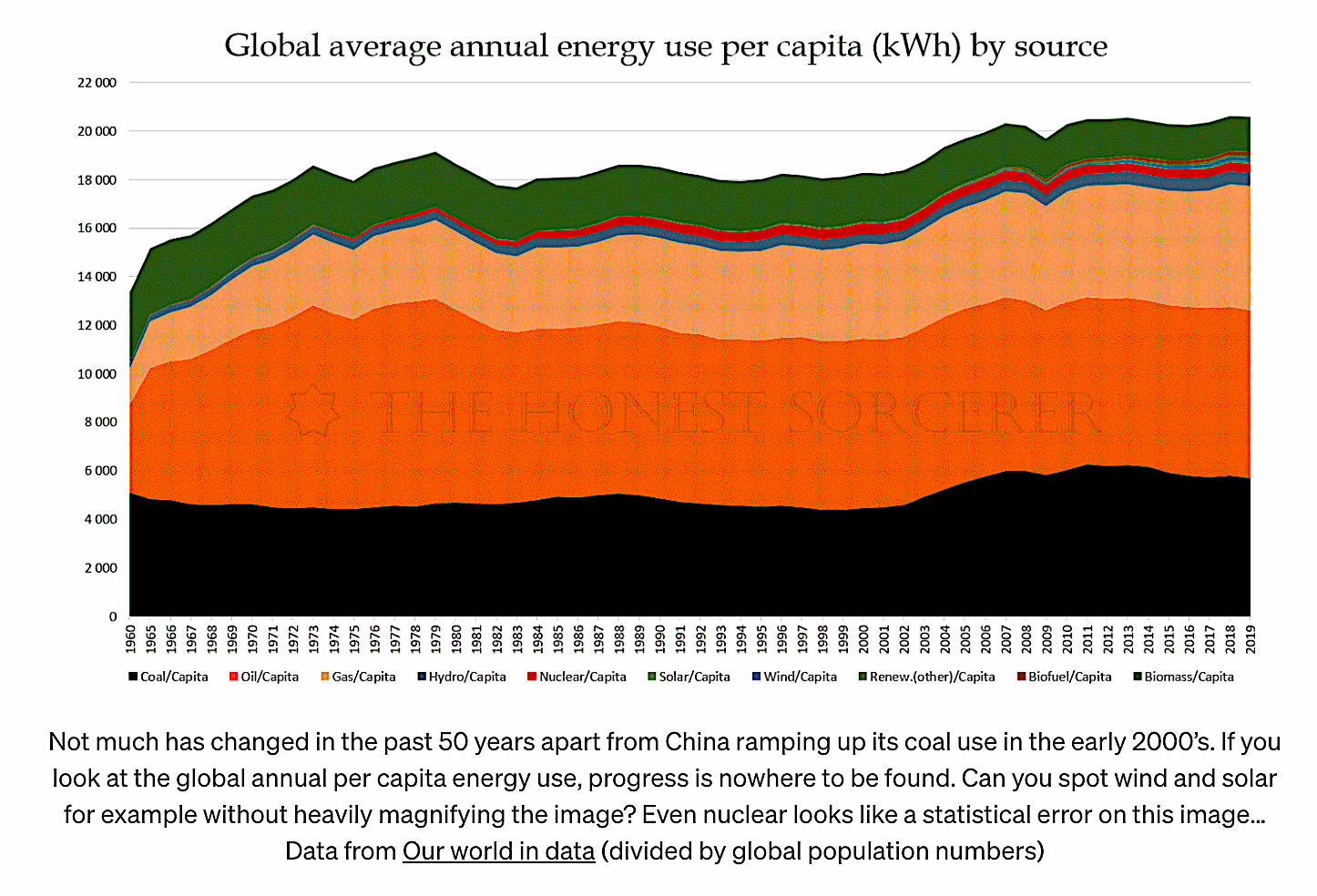
cartoon by the amazing Will McPhail (his new book’s now out)
It’s very strange regularly being triggered into a state of anxiety, while “knowing” intuitively and intellectually that there is nothing to be anxious about.
It’s very strange dealing regularly with people who are progressive in their beliefs and intentions, but who are so suspicious and frightened of ‘government’ that they sabotage many of the actions that would further their goals and desires.
It’s very strange watching bright, informed people embrace bizarre beliefs that completely undermine their credibility in other areas where they are making cogent and important arguments.
These are strange times we live in. This is, I suppose, what collapse looks like.
COLLAPSE WATCH

Overshoot and our de-growth future: The Honest Sorcerer explains what happens when you can’t get blood (or oil) out of a stone, as the supply of affordable energy dries up. The chart above is his, showing our progress toward so-called “renewable” energy. We all know what “needs” to happen, and we also know it’s not going to happen.
Bill Rees on sustainability and collapse: A useful recap of Bill’s argument that collapse is inevitable and human population will soon drop by as much as 6B people:
H. sapiens is inherently – and even predictably – unsustainable. The human ecological predicament is the product of base human nature reinforced by an ingrained, increasingly global, but radically maladaptive growth-based cultural narrative. Modern techno-industrial (MTI) society cannot be ‘reformed’ to mesh harmoniously with biophysical reality.
The collapse of our narratives: Murray Grimwood argues that a significant part of our anomie, helplessness and anger can be attributed to the fact that, for the second time in a generation, the dominant culture’s narratives are collapsing, having lost every shred of credibility, but without anything to take their place. What would we do without our stories? Thanks to Phil in NZ for the link.
Our inability to face our fears, including our fear of death: XR’s Roger Hallam (starting at 7’00” of this video) rambles all over the existential place about our lack of “spiritual congruence”, our addiction to “atomized rationalization”, the non-existence of the separate self, the courage of resistance that calls us only when we work in community, and the essential idea of service to the other instead of the absurdity of “enlightened self-interest”. Weird and fascinating.
You can’t get there from here: There’s a lot of discussion in climate change and other activist circles about so-called “Game B”, another way of living and acting and what it would take to get there. This naive simplification of massively complex problems to simple game theory has been around for generations and continues to enthral wishful thinkers. Remember Charles Reich and “Consciousness III”? Here’s a like-minded guy who claims to have all the answers. It makes for sad and disheartening reading to think people can still be so unaware about how the world really works. But there we are. We’ve all been there at some point in our lives. Thanks to Jae Mather for the link.
A precursor of what’s to come: James Ross Gardner harrowingly describes the three staggeringly record-breaking days in June (not even summer yet!) during the “Heat Dome”, a “once-in-a-millennium” event that killed hundreds if not thousands in the Pacific Northwest, one of the most affluent areas on the planet, and which will soon become commonplace everywhere as climate collapse accelerates.
Supply shortages as manifestations of economic collapse: Umair Haque describes the shortages of everything that precede economic collapse, and what we should expect as it occurs and becomes permanent.
LIVING BETTER

From the Potentially Inappropriate Memebrary For Historians and Literaries FB Page
Finding the mother trees: UBC prof Suzanne Simard writes about how understanding how trees communicate and cooperate can teach us an enormous amount about how to build and sustain community and society. Sadly, her work is being coopted to greenwash some of Canada’s most egregious forestry corporations, such as Canfor, Interfor and BC Timber Sales.
Kate Raworth’s “doughnut economics” takes hold: David Bollier explains why, despite its broad endorsement worldwide, it has been shunned by the economics establishment. Meanwhile, Amsterdam is looking to implement it as a decision model for development.
What if Facebook disappeared?: Could we find a good replacement for it, for small businesses, virtual associations and families that now depend on it? Are there grounds for taking it down because it’s too popular? What exactly is Facebook now, anyway? Hank Green dissects the issue brilliantly. Hint: It’s a lot about feeding our propensity to like feeling “righteously superior”, and the fact that, rather than just “hosting content”, they decide which content gets hosted, and even more importantly, which content gets promoted. Bonus: Hank also tells other ulcerative colitis sufferers (like me), what a colonoscopy entails and why it’s worth the risk. (Is my hesitancy analogous to that of the vaccine-hesitant? Hmmm.)
POLITICS AND ECONOMICS AS USUAL

cartoon by Michael Leunig, of course
Corpocracy, Imperialism & Fascism: Short takes:
- With the fascists now firmly in power in Texas and other southern states, is the answer to brutal anti-abortion laws as simple as distributing abortion pills? Or does their “fall-back” use represent a disastrous defeat for women’s reproductive rights?
- As we move closer and closer to robot armies, “robo-dogs” are now being equipped with automatic weapons.
- The Frances Haugen testimony reveals a huge campaign of cover-up and denial when Facebook’s own research revealed the horrific psychological damage its platforms cause to millions of children. Thanks to Kavana Bressen for the link, and the one that follows.
- Anne Applebaum explains how institutions like universities, newspapers, foundations and museums, are meting out career- and life-destroying punishments to people not even accused of an illegal act, without any due process, feeding the accusations of “cancel culture” from the right wing.
Misinformation and Disinformation: Short takes:
- Canada, under a gone-rogue military Lt-Gen, is leading NATO’s efforts to wage propaganda wars against their own citizens on a wide swath of subjects, purportedly to “learn more” about how “cognitive warfare” can be used to advantage by the military-industrial complex. The Canadian government was deliberately kept in the dark about the program. Thanks to Caitlin Johnstone for the links.
- False and misleading information about the nature of China’s activity near Taiwan is being used by war-mongers to whip up support for war against China.
- A new study shows that the proportion of true old-growth forest in BC is 0.08% of its total forest area, not the 23% claimed by the government. “We’ve basically logged it all”, the report concludes.
- My book’s publisher, Chelsea Green, is unapologetically pushing the CoVid-19 conspiracy theories of Joseph Mercola and JFK Jr by publishing their latest book. Thanks to PS Pirro for the link.
CoVid-19 Becomes the Pandemic (mostly) of the Unvaccinated: Short takes:
- Lots of evidence that in the unlikely case that you’re CoVid-19 infected after being vaccinated, you’re still much less of a danger to those around you than the unvaccinated are.
- After 18 months of the Go-For-Zero strategy, is NZ’s abandonment of it in the face of the Delta surge “a death warrant for the Maori”?
- How extreme right-wing groups are profiting from selling discredited CoVid-19 cures and treatments like Ivermectin. Thanks to Kavana Bressen for the link.
- Under Canadian laws, inadequate mandates and restrictions and government inaction are more likely to qualify as a violation of citizens’ rights and freedoms, than vaccine and mask mandates are.
FUN AND INSPIRATION

cartoon by Vancouver’s Pia Guerra and Ian Boothby in the New Yorker
Potentially inappropriate: The Potentially Inappropriate Memebrary For Historians and Literaries Facebook Page is hilarious and completely addictive for people sufficiently familiar with literature, history and the arts to get the references.
Looking closer: Hank Green summarizes the top micro-photos of 2021.
Life and work: Liana Finck does a mind-blowing sketch of both. It took me an hour of study of fully appreciate it.
THOUGHTS OF THE MONTH

From the Potentially Inappropriate Memebrary For Historians and Literaries FB Page, posted by Doug Crowe
From Jenifer Lewis on The Problem with Jon Stewart: On complaints that mask mandates are a form of oppression: “Black people have been dealing with oppression for 400 years. They picked cotton. You just have to wear it.”
From Indi Samarajiva: “Democracy is like a bicycle–if you’re not moving forward, you’re falling off… American democracy is not free, it’s freemium, and the paid service is much, much better.
From Forbes magazine: “54% of U.S. adults 16-74 years old – about 130 million people – lack proficiency in literacy, reading below the equivalent of a sixth-grade level.” That’s the majority.
From John Green’s favourite jokes:
A priest, an imam, and a rabbit walk into a bar. The rabbit leans over to the bartender and says, “I don’t want to alarm anyone, but I think I might be a typo.”
I went into Starbucks and asked for their mildest roast. They said “you have very average ears.”





I am in agreement with much of what you write and even when I disagree it’s usually a matter of judgment and opinion and not fact.
Yet your comment that ivermectin has been discredited may well be
literally true. But that doesn’t mean it’s not a safe and effective drug for Covid.
The authorities in most western countries have had a vendetta against it, perhaps because they’re afraid it would undercut vaccines and pharmaceutical profits.
But whatever the reason there is substantial evidence that it is likely to work and in the absence of any recognized effective early treatment there is no downside in using it as it has been proven safe with over 4 billion doses prescribed.
Here’s a link to one analysis of its effectiveness published in a peer reviewed medical journal:
https://journals.lww.com/americantherapeutics/fulltext/2021/06000/review_of_the_emerging_evidence_demonstrating_the.4.aspx
I hope you will read it and keep an open mind. Thanks!
Man, the nonsense never stops. Merck, which manufactures ivermectin, for god’s sake, and which stands to make a huge profit from its use, says simply: Don’t use it. It is useless for CoVid-19 or any other viral infection. It’s an anti-parasitic, a completely different class of drugs from antibiotics and antivirals. There are published studies that support all kinds of cures for all kinds of diseases, most of which eventually get retracted, but the overwhelming number of studies show that anti-parasitics do not treat viruses. There is no “vendetta” against them. You want to take a damned pill for CoVid-19, at least take an antiviral, for god’s sake. Stop putting money in the pockets of loony TV doctors, podcast pundits and right-wing racketeers like AFD. And please, please, f&*$g get vaccinated. /rant
Lots of great links! Thanks.
Herb, I agree. It has been dismissed based on “overwhelming evidence”, and yet there’s also plenty of “evidence” in its favor for early treatment (before serious symptoms). But hell, I’m not very familiar with the evidence nor qualified by training to judge, so I have to wait a few years and see whether there’s anything like a consensus then.
Of course, by then, the ongoing decay (in legitimacy and otherwise) of practically all of our institutions will probably mean that consensus regarding any weighty matter will be doubly hard to obtain; we (“the public”) will make decisions based on the biases of our affinity groups, informed by many streams of propaganda and instantly updated by electronic media (censored Facebook, Twitter, etc., plutocrat-owned news media, plus various crazy-making collections of unanchored thought). Fun to watch, eh?
Ahem… Dave… Yes, I think that you well might be right about “This is what collapse looks like.
But we should think about what the reasons are. I think that you are about the same age as me. In the 1970s and 1980s in America, we kids went out to play in the neighborhood and had to be back by dark, or dinnertime, whichever cane first. This is our life. I got after school care from a neighbor housewife, and it was quite traumatic in third grade to have my peer in the class who was her son not want me to come over after school. I had to call my mother ar work and have her make a phone call.
We were a generation who grew up with the ability to problem solve. We had to eventually learn to take care of our own skinned knees.
The next generation was raised with large television sets as a babysitter in the living room. This was “mamma’s little helper” of the 1990s. What does that do to people’s problem solving ability. Nothing good, I’ll tell you that.
They don’t trust libraries and books anymore. All the librarians that I knew, growing up, and I lived across the street from a library for awhile, told me that you have to figure out for yourself what is true and false. You can’t have someone else say that x or y is “disinformation.” You as a thinking, living human being are then removed from the equation. Your critical thinking abilities atrophy.
That is the problem, as I see it, with overly rich Democrats like Nancy Pelosi and Joseph Robinette Biden. They learn to be tools of the establishment (or of wealthy interests, if you’d rather) because they aren’t like Andrew Yang and Pete Buttigieg – who are children of your and my generation. We learned to problem solve as children, but we also started our college career with basic education – survey courses. There are so many things in any first year Biology textbook which cause people to ask questions.
So you say this:
> It’s very strange dealing regularly with people who are progressive in their beliefs and intentions, but who are so suspicious and frightened of ‘government’ that they sabotage many of the actions that would further their goals and desires.
Let me remind you that you live in something of a utopian paradise – the nation of Canada.
Now, you are such an amazing wordsmith that you probably have a lot of loyalty to the British and Canadian intellectual traditions.
I was watching David Starkey today with his furrowed brow discussing his demands that people having tea or coffee next door should not think about historical figures in a false light.
https://youtu.be/TvwPybHC5xw
He’s quite particularly about that. Personally, I’d be very happy if at coffee tables all over the country, they were talking about these figures more often in general, in any context at all. I think that I remember in Nova Scotia at seven years old having it out with some elderly neighbors from Scotland with whom I played marbles whether or not it was OK to discuss such giants of history in an out of kilter way. I got an earful. My big brother had helped me prepare this conversation. He had given me the word “off-colour” to describe what I was talking about, and I didn’t understand what that meant, yet.
We Americans have a lot of immigration from all over the world. And many of these people grew up in families where they routinely discussed the evils of government. These are our friends and neighbors and colleagues at the office.
When they point out parallels that they see in our country to their lived experiences back when they were small it needs to be taken seriously. It’s like that canary in the coal mine who pays a high price when he warns the miners of a gas that has suddenly invaded the mine shaft.